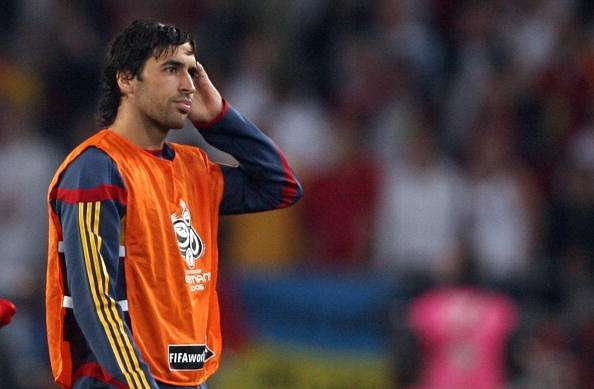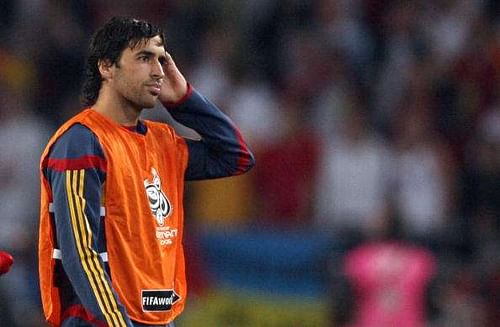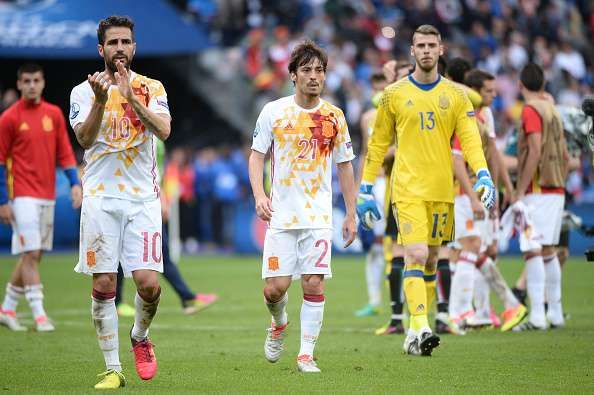
Euro 2016: Spain’s golden era is finished, but golden generation could still continue with Vicente Del Bosque's departure

And then came the change. Despite the cries of millions of Spaniards, it happened: Raul Gonzalez Blanco was dropped from the Spain national team after the 2006 World Cup exit, never to return again.
“Do you know how many World Cups Raúl's been to?" asked Luis Aragones to an angry and revolting Raul fan in 2007. There's a pause. "Three," continued Aragonés. "And do you know how many European Championships Raúl's been to?" Without even waiting for a reply this time, he said, "Two. Three and two, that's five [major tournaments]. Tell me how many he's won. Tell me, come on, tell me how many he's won."
The fan, flabbergasted at how the then Spain coach snapped, doesn't reply despite knowing the answer. Aragones turned away before turning back: "How many? None."
Sacking Raul was more about making a statement
Raul was the symbol of Spain – he oozed red and a Spain team without him was unthinkable. Fans began loathing Luis Aragones. After all, Raul was still quite far away from declination and the decision to drop the axe on him wasn’t one that the Roja fans could swallow.
However, it wasn’t the player that was sacked – it was the symbol.
Dropping Raul was never because of the player, he was still capable of operating as the striker for Spain and one could actually argue that he would have been a perfect fit to the tiki-taka that Spain played following his departure.
It was all about making a statement – and a very bold one at that.
Luis Aragones knew that a change was direly needed. For years, Spain went into the World Cup with a really strong squad, but always fell short not because for the lack of talent – they had that in abundance – but for an apparent shortage of mental strength, the will to churn wins come the final whistle.
Being the captain back then, Raul had to be dropped. It was a necessity, an act needed to remove the over-reliance on their star player. They had a lot of talent, yet it felt like the identity of Spain was confined within the luminous figure of the Real Madrid legend.
Spain needed a distinctiveness of itself and it could have only happened if the other players came out of the shadow of the great man. So Raul had to be removed from the equation.
Back then, only a very few understood the importance of that move. 10 years down the line, almost every fan of La Furia Roja marks that as the turning point of Spain’s history.
Del Bosque was aware that a change was needed, and that he wasn’t the man to do it
After winning the World Cup in 2010, Vicente del Bosque knew that something similar was needed to be done. He knew that some of the stars would be too old to be at their prime in the next World Cup—and, hence, he offered to quit his role as Spain’s boss.
The Spanish FA, in an act to show gratitude, rejected his request and asked him to carry on as the boss. Spain won the following Euro in 2012, but measures had to be taken if they were to continue their dominance.
Del Bosque, perhaps, knew deep down that he wasn’t strong and cold enough to drop the stars that brought so much glory to Spain. Despite knowing that a change was needed, he just couldn’t conjure up enough strength to turn his back on the players that were so loyal to him.
Football fans often tend to overlook the human sentiment within football personalities. After years of being together, a team becomes a family – especially in a national team where the players share the same national identity.
If one puts her/himself in del Bosque’s shoes, 9 out of 10 people would have done what the former Real Madrid boss did: continue with the declining players. After all, snubbing family isn’t as easy as many think.
This is why del Bosque himself offered to resign because a new manager would have found it easier to drop the axe on the legends of the team.
10 years on since World Cup 2006, Spain are once again in need of a change

As Spain crash out of the UEFA Euro 2016, many people claim that this is the end of Spain’s golden generation. To an extent, they are right. It is the end of something golden, but not a generation – only the era.
While Del Bosque took a very diverse squad with him, something that he didn’t do in the World Cup 2014, he failed to replicate the variety in the starting XI, playing a very narrow 4-2-3-1 with an out-of-form Cesc Fabregas in the middle coupled with David Silva on the wings, who doesn’t add anything new to the system from there.
It seemed absurd, then, to take players like Lucas Vazquez and Koke and never use them in the starting XI.
Now, with another failure looming over their heads, a change is the need of the hour. Spain still have countless talented players – the likes of Isco, Saul and Marco Asensio couldn’t even make it to the squad – and it is time to amalgamate youth and tweak the system that attracted trophies and praises alike. And it is time for Del Bosque to leave without further damaging his legacy.
Spain were eliminated on 27 June, the day Raul turned 39. 10 years on from 2006, all he got for his birthday was a present filled with the pain of seeing his beloved team crash out of Euro 2016. It signaled towards another change – the end of one golden generation, but it could be the beginning of another.